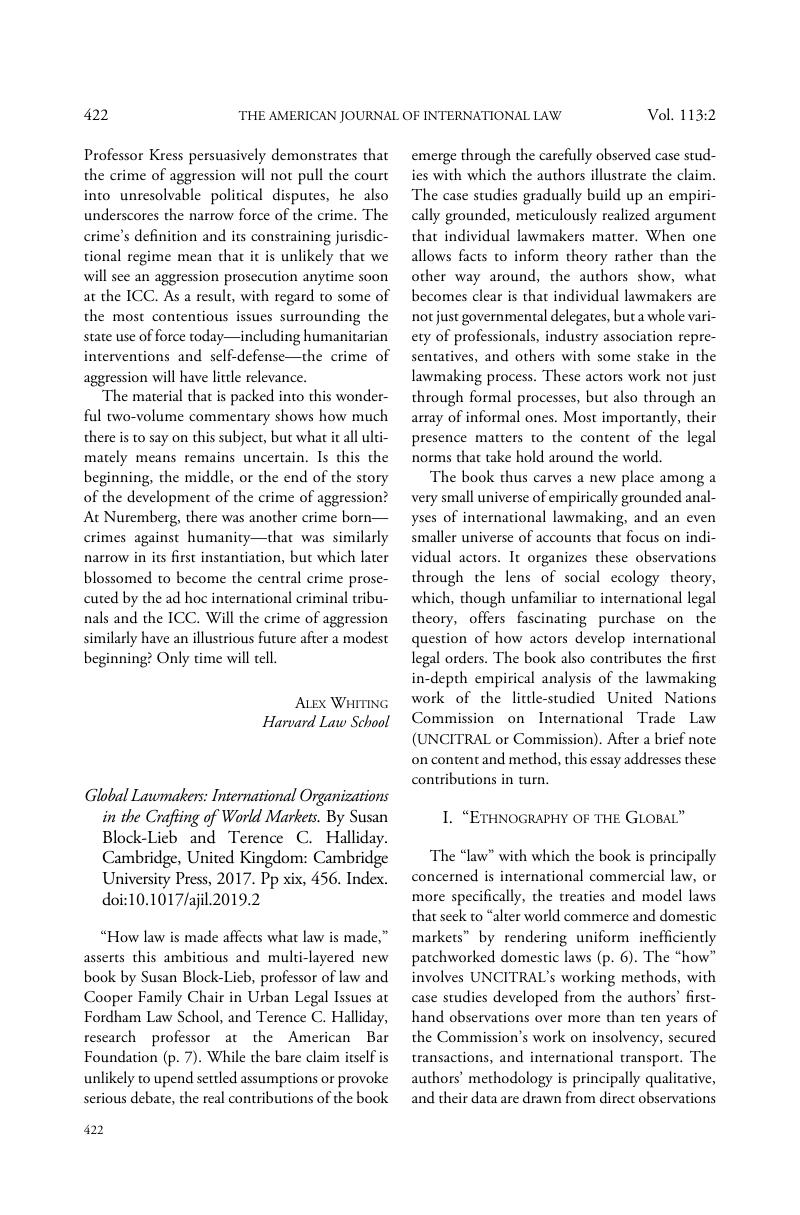Article contents
Global Lawmakers: International Organizations in the Crafting of World Markets. By Susan Block-Lieb and Terence C. Halliday. Cambridge, United Kingdom: Cambridge University Press, 2017. Pp xix, 456. Index.
Published online by Cambridge University Press: 09 April 2019
Abstract

- Type
- Book Reviews
- Information
- Copyright
- Copyright © 2019 by The American Society of International Law
References
1 Chapters 3, “Issue-Ecologies in Formation,” and 7, “Whose Global Norms?,” in particular, survey how UNCITRAL came to approach lawmaking in each of these substantive areas, and how particular outcomes in those areas were attained, respectively.
2 Hathaway, Oona A., Do Human Rights Treaties Make a Difference?, 111 Yale L.J. 1935, 1961 (2002)CrossRefGoogle Scholar; see also Moravcsik, Andrew, Taking Preferences Seriously: A Liberal Theory of International Politics, 51 Int'l Org. 513 (1997)CrossRefGoogle Scholar.
3 José Alvarez, International Organizations as Law-Makers (2006).
4 See, e.g., Exploring the “Socio” of Socio-Legal Studies 4–8 (Dermot Freenan ed., 2013).
5 Kingsbury, Benedict, Krisch, Nico & Stewart, Richard B., The Emergence of Global Administrative Law, 68 L. & Contemp. Probs. 15, 17 (2005)Google Scholar.
6 John Braithwaite & Peter Drahos, Global Business Regulation (2000).
7 Tim Büthe & Walter Mattli, The New Global Rulers: The Privatization of Regulation in the World Economy (2011).
8 Charnovitz, Steve, Nongovernmental Organizations and International Law, 100 AJIL 348 (2006)CrossRefGoogle Scholar.
9 Durkee, Melissa J., International Lobbying Law, 127 Yale L.J. 1742 (2018)Google Scholar.
10 See, e.g., Abbott, Kenneth W. & Gartner, David, Reimagining Participation in International Institutions, 8 J. Int'l L. & Int'l Rel. 1 (2012)Google Scholar.
11 See Transnational Legal Orders 11 (Terence C. Halliday & Gregory Shaffer eds., 2015) (elaborating a theory of transnational legal orders, defined as “a collection of formalized legal norms and associated organizations and actors that authoritatively order the understanding and practice of law across national jurisdictions”).
12 World Health Organization [WHO], Framework of Engagement with Non-State Actors, WHA69/2016/ REC/1 (May 28, 2016).
- 1
- Cited by


